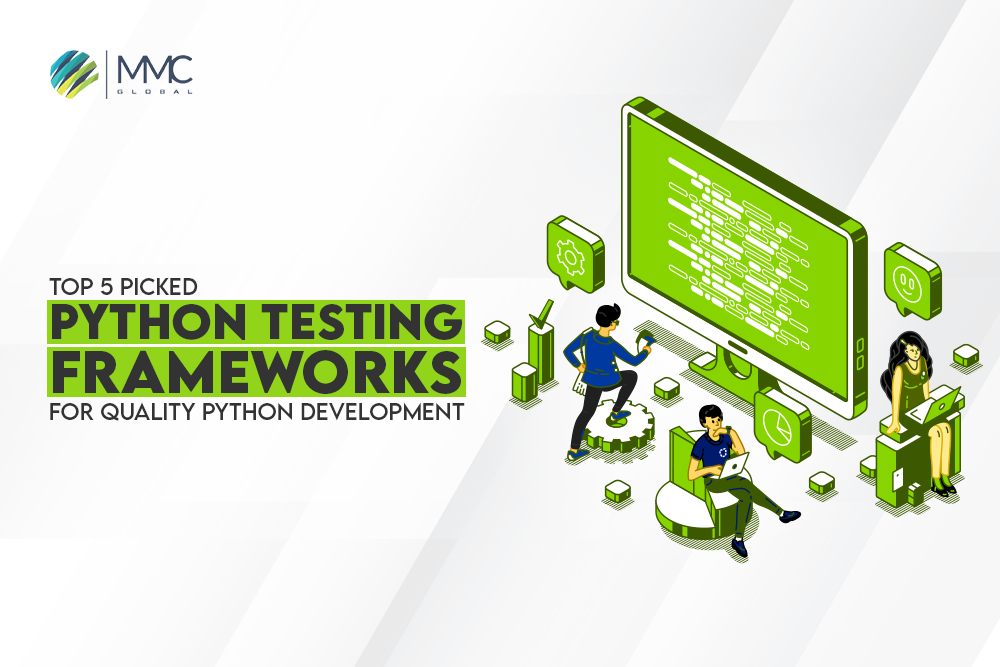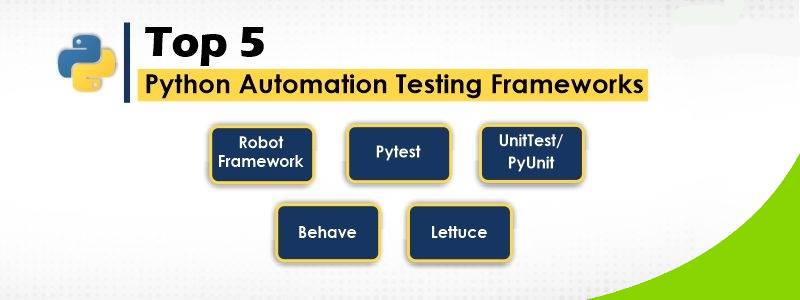Top 5 Picked Python Testing Frameworks For Quality Python Development


Testing is a significant step in the software development process, and when it is a Python-based project, Python testing frameworks are everything you need to deliver the best. Python is a widely used programming language because it can be used in multipurpose solution development. This includes website development, software development, business automation, data analytic solutions, etc.
Python development services are highly in demand due to their ability to build outstanding and flawless solutions. In fact, they provide a wide range of programming language libraries and, on top of that, Python testing frameworks that make the development process flawless.
These Python testing frameworks made developers’ and testers’ lives easier. However, due to the paradox of choices in the Python testing framework, a buzz has been created about choosing the best framework during the testing process.
There are several aspects to consider when choosing a Python testing framework, including the script quality of the framework, the simplicity of the test cases, and the technique for running the modules so that the identification of errors and bugs can be encountered in real time.
This article explains seven types of Python testing frameworks and their use cases, helping you choose the ideal one for your development stage.
5 Best Python Testing Frameworks That Ensure Your Code Quality
Testing is the most crucial step that cannot be negotiable for quality assurance of your developed product, whether it is a website or software application. Before moving forward to the list of testing frameworks, let’s see what a Python testing framework is.
Furthermore, Python testing frameworks are effective frameworks based on Python programming language standards that support automation testing. They contain tools and libraries to create, execute, and report testing issues.
Moreover, companies like us provide Python development services to help you build competitive solutions for your business. We deliver QA and testing services for any project to make your development effort worth it. In fact, our proven track record makes us a top-notch software development company in the US that always fulfills clients’ expectations.

There are many Python testing frameworks; the list is mentioned below.
- Pytest
- PyUnit or UnitTest
- Behave
- Robot
- Lettuce
- Doctest
- Nose2
PyTest Framework
The best part of using the Pytest framework is that it only requires a basic knowledge of Python, including a functioning CLI, an IDE, and Python version 3.7 or newer on your desktop. It provides a concise, readable, and user-friendly syntax for writing tests. Moreover, Pytest emphasizes testing APIs, user interfaces, and databases.
To be compatible with the scalability of the Python programming language, it can support PyPy 3 and Python 3.7+ versions. By using PyTest, testers can reduce the time of implementation. In addition, PyTest’s reporting provides insightful details about pesky bugs and diagnoses and timely addresses test failures.
It would help if you opted for PyTest to handle simple to more complex testing scenarios involving fixtures, parametrization, and test discovery.
- User-friendly and readable
- Easy to set up in less time
- Rich Plugin Architecture
- Detailed reporting of issues
PyUnit Framework
PyUnit Framework is another crucial framework that helps in testing individual units of coding to ensure proper functioning. The intent of the PyUnit framework is to identify functioning flaws in a single component or feature of the whole software. It can process as soon as you build a single component because it is a built-in testing framework.
It is more influenced by the JUnit framework. Those familiar with the Javascript Unit test framework can easily learn and handle PyUnit testing. Furthermore, the PyUnit Testing Framework is easily integrated with the Python standard library. With seamless integration within the library, developers do not need to spend time setting up and installing anything.
You should opt for straightforward testing to validate the functioning of every unit. This helps developers identify flaws earlier and before they become deeply embedded in the codebase.
- Built-in testing framework
- Real-time testing of a single unit
- Generate detailed XML reporting
- Steep learning curve
Behave Testing Framework
Behave Python Testing Framework is a powerful tool for automating tests in Python projects. It follows the Behavior-Driven Development (BDD) approach, allowing developers and stakeholders to collaborate effectively in defining test scenarios using simple, human-readable language.
By writing tests in Gherkin syntax (a language everyone understands/simple human language), Behave promotes more transparent communication and better alignment between technical as well as non-technical team members.
However, writing test scenarios becomes straightforward and efficient with its user-friendly syntax. Developers can focus on defining their applications’ behavior without getting bogged down in technical details.
With its intuitive syntax, modular design, and seamless integration capabilities, Behave empowers teams to build reliable, scalable test suites that ensure the quality and integrity of their software applications.
- Scalable as well as human-readable syntax
- Better understanding of techies and non-techies
- Efficiency in large test suites
- Seamlessly integrate with Python testing tools
Lettuce Testing Framework
Similar to the Behave testing framework, the Lettuce testing framework promotes the BDD approach. It also supports Gherkin syntax, which delivers simple human-based language syntax for a clearer understanding.
Furthermore, it encourages team cohesiveness and collaboration and promotes a clearer understanding of concepts between non-technical and technical members. Testers use lettuce for low-risk and straightforward projects as it is incompatible with testing complex features as well as functionalities like other Python testing frameworks.
- Simple yet reader-friendly syntax
- Easy to understand for non-techies
- Ideal framework for a small BDD project
- Support integration testing tools
Get More Info: PHP VS PYTHON: Which One Developer Loved Most In 2022
Robotic Testing Framework
It is one of the most used Python testing frameworks for Robotic Process Automation, acceptance testing, and acceptance test-driven development. Robotic Python Testing Framework represents a cutting-edge approach to automated testing in Python projects.
With its innovative features and advanced capabilities, the Robotic Python Testing Framework streamlines the testing process, enabling developers to create robust and comprehensive test suites easily.
By leveraging robotics-inspired techniques, this framework offers unparalleled efficiency and reliability. As a result, it allows teams to identify and address software issues quickly and effectively.
With its intuitive interface and extensive documentation, the Robotic Python Testing Framework empowers developers to elevate the quality and performance of their applications, paving the way for smoother development cycles and superior end-user experiences.
- Keyword-driven syntax
- Easy integration with other libraries
- Auto-generated test documentation
Ending Note
Conclusively, Python testing frameworks speed up the development process and reduce project delivery timelines. Python provides the ultimate source of an effective automation testing process from unit testing to robotic testing.
If you want to proceed with quality assurance and testing services, MMC Global offers a dedicated team of Python developers and testers who help you build flawless software and business automation solutions. Contact us to get more details about our services and the milestones that we have achieved.



